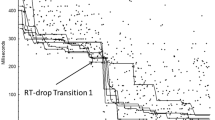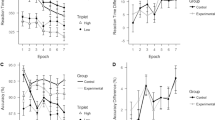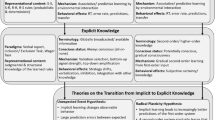Abstract
Five experiments investigated the formation of explicit knowledge of a repeating sequence in a sequential reaction time task. Reliable explicit knowledge was obtained even though various conditions prevented the selective improvement of RTs (Exps. 1–4). This knowledge emerged early during training. Participants were able to recognize segments of the sequence (Exps. 3 and 4) or correctly assess the probabilities of transition of the target between successive locations (Exp. 5) after only two blocks of training trials. These findings rule out an interpretation of sequence learning that posits that explicit knowledge emerges from implicit knowledge during the course of training. Although these findings are compatible with a framework centered around the notion of dissociation between implicit and explicit knowledge, they are also consonant with a questioning of the usefulness of the concept of implicit knowledge.
Similar content being viewed by others
References
Cohen, A., Ivry, R. I., & Keele, S.W. (1990). Attention and structure in sequence learning. Journal of Experimental Psychology: Learning, Memory, and Cognition, 16, 17–30.
Frensch, P. A., Buchner, A., & Lin, J. (1994). Implicit learning of unique and ambiguous serial transitions in the presence and absence of a distractor task. Journal of Experimental Psychology: Learning, Memory, and Cognition, 20, 567–584.
Higham, P. A., & Vokey, J. R. (1994). Recourse to stored exemplars is not necessarily explicit: A comment on Knowlton, Ramus, and Squire (1992). Psychological Science, 5, 59–60.
Karmiloff-Smith, A. (1992). Beyond modularity: A developmental perspective on cognitive science. Cambridge, MA: Bradford/MIT press.
Neal, A., & Hesketh, B. (in press). Episodic knowledge and implicit learning. Psychonomic Bulletin and Review.
Nissen, M. J., & Bullemer, P. (1987). Attentional requirements of learning: Evidence from performance measures. Cognitive Psychology, 19, 1–32.
Pascual-Leone, A., Grafman, J., & Hallet, M. (1994). Modulation of cortical motor output maps during development of implicit and explicit knowledge. Science, 263, 1287.
Perruchet, P., & Amorim, M. A. (1992). Conscious knowledge and changes in performance in sequence learning: Evidence against dissociation. Journal of Experimental Psychology: Learning, Memory, and Cognition, 18, 785–800.
Perruchet, P., & Gallego, J. (in press). A subjective unit formation account of implicit learning. In D. Berry (Ed.). How implicit is implicit learning. Oxford: Oxford University Press.
Perruchet, P., & Vinter, A. (in press) Learning and development: The implicit knowledge assumption reconsidered. In M.A. Stadler & P. A. Frensch (Eds), Handbook of implicit learning. Thousand Oaks, CA: Sage Publications.
Perruchet, P., Vinter, A, & Gallego, J. (in press). Implicit learning shapes new conscious percepts and representations. Psychonomic Bulletin and Review.
Reber, A. S. (1989). Implicit learning and tacit knowledge. Journal of Experimental Psychology: General, 118, 219–235.
Reed, J., & Johnson, P. (1994). Assessing implicit learning with indirect tests: Determining what is learned about sequence structure. Journal of Experimental Psychology: Learning, Memory, and Cognition, 20, 585–594.
Seger, C. A. (1994). Implicit learning. Psychological Bulletin, 115, 163–196.
Shanks, D. R., & Johnstone, T. (in press). Implicit knowledge in sequential learning tasks. In M. A. Stadler and P. A. Frensch (Eds.), Handbook of implicit learning. Thousand Oaks, CA: Sage Publications.
Shanks, D. R., & St. John, M. F. (1994). Characteristics of dissociable human learning systems. Behavioral and Brain Sciences, 17, 367–447.
Stadler, M. A. (1992). Statistical structure and implicit serial learning. Journal of Experimental Psychology: Learning, Memory, and Cognition, 18, 318–327.
Stadler, M. A. (1993). Implicit serial learning: Questions inspired by Hebb (1961). Memory and Cognition, 21, 819–827.
Stadler, M.A. (1995). Role of attention in implicit learning. Journal of Experimental Psychology: Learning, Memory, and Cognition, 21, 674–685.
Vinter, A., & Perruchet, P. (in press). Relational problems are not fully solved by a temporal sequence of statistical learning episodes. Behavioral and Brain Sciences.
Willingham, D. B., Greeley, T., & Bardone, A. M. (1993). Dissociation in a serial reaction time task using a recognition measure: Comment on Perruchet and Amorim (1992). Journal of Experimental Psychology: Learning, Memory, and Cognition, 19, 1424–1430.
Willingham, D. B., Nissen, M. J. & Bullemer, P. (1989). On the development of procedural knowledge. Journal of Experimental Psychology: Learning, Memory, and Cognition, 15, 1047–1060.
Author information
Authors and Affiliations
Rights and permissions
About this article
Cite this article
Perruchet, P., Bigand, E. & Benoit-Gonin, F. The emergence of explicit knowledge during the early phase of learning in sequential reaction time tasks. Psychol. Res 60, 4–13 (1997). https://doi.org/10.1007/BF00419676
Received:
Accepted:
Issue Date:
DOI: https://doi.org/10.1007/BF00419676




